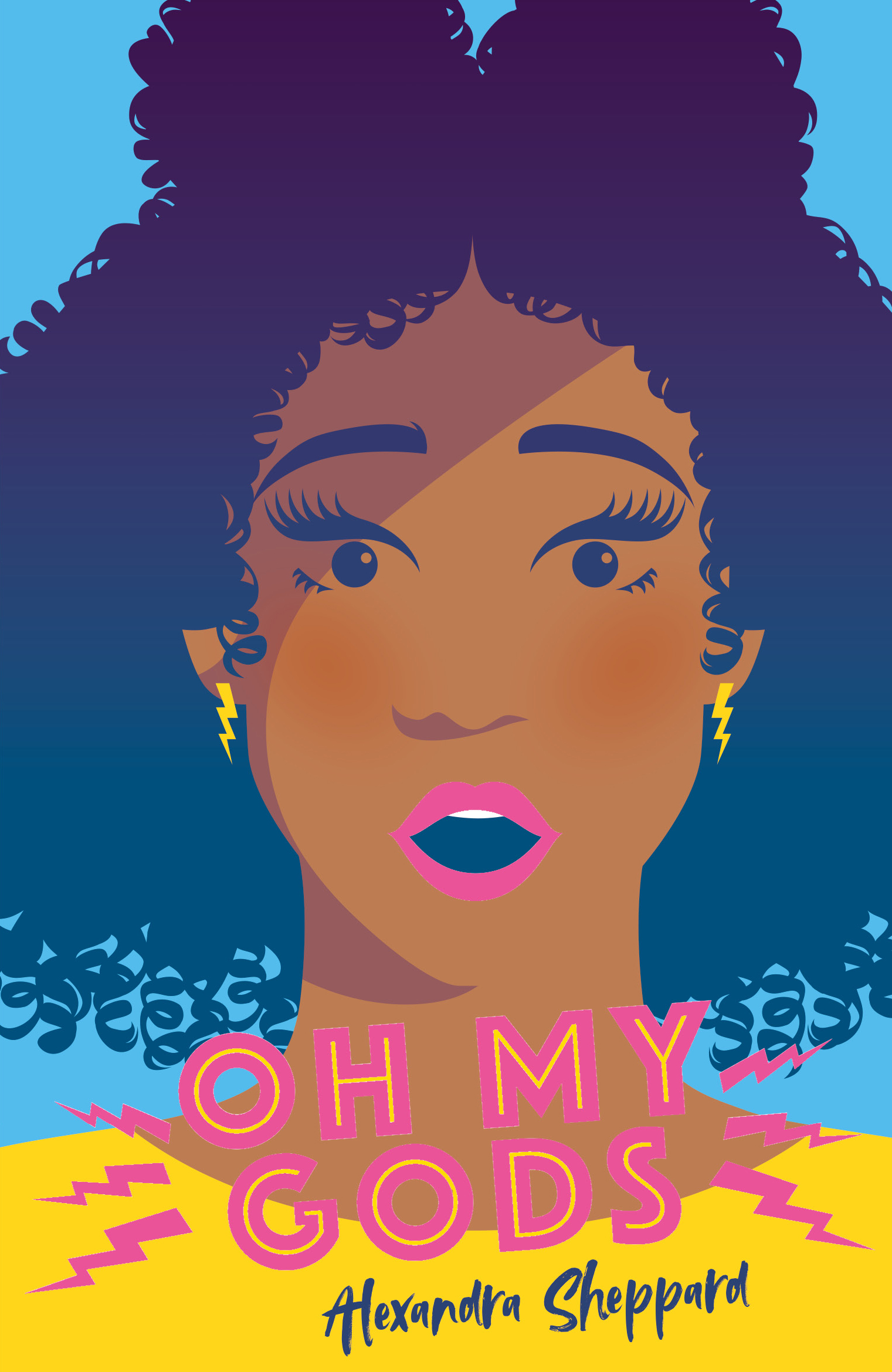Title of the work
Country of the First Edition
Country/countries of popularity
Original Language
First Edition Date
First Edition Details
Alexandra Sheppard, Oh My Gods. London: Scholastic, 2019, 352 pp.
ISBN
Genre
Mythological fiction
Novels
Target Audience
Young adults
Cover

Courtesy of the publisher.
Author of the Entry:
Jean Menzies, University of Roehampton, menziesj@roehampton.ac.uk
Peer-reviewer of the Entry:
Susan Deacy, University of Roehampton, s.deacy@roehampton.ac.uk
Lisa Maurice, Bar-Ilan University, lisa.maurice@biu.ac.il

Alexandra Sheppard
, b. 1988
(Author)
Alexandra Sheppard is an English/Jamaican author born and raised in London where she currently lives and works. She is a social media strategist with experience working for various large brands and in 2019 her debut novel, Oh My Gods, was published by Scholastic. She has written for magazines including Mslexia and Time Out, and she was also previously shortlisted for was shortlisted for Megaphone, the UK-based mentoring and development scheme for children’s authors from a black, Asian or minority ethnic background.
Bio prepared by Jean Menzies, University of Roehampton, menziesj@roehampton.ac.uk
Questionnaire
Jean Menzies has interviewed the author of this book for her podcast, That’s Ancient History, which can be listened here (accessed: January 28, 2019).
Summary
Oh My Gods is set in a fictional modern day in which the Greek Gods continue to exist although they are no longer worshipped. Zeus, and a host of other deities including Eros, Aphrodite and Apollo, have chosen to abandon the tedium of with Mount Olympus in favour of living a near-mortal life on Earth, incognito. In the spirit of mythological tradition Zeus has continued to procreate with mortal women into the 21st century. In this novel we follow his 14 years old, half-mortal daughter Helen whose Jamaican mother has passed away meaning she has to move in with her all-powerful dad in North-London for the first time. Our protagonist faces the everyday challenges of being a teenager, from new schools to first kisses, with the added anti of eccentric half-siblings like Aphrodite and Apollo making it difficult to hide her family’s secret.
Analysis
Oh My Gods reimagines the Greek Olympians in a modern context. Although each of the gods depicted in the novel have lived for thousands of years and, as is continually referenced, lived the lives recounted by those Ancient Greek myth known to us, their personalities and behaviour have adapted to 21st century London. At first glance, each god appears almost to be a caricature of their most famous attribute: Aphrodite is cast as the vain makeup artist, Athena the pragmatic lawyer, Eros the spiritual hippy and Apollo the arrogant musician. Meanwhile Helen is an ordinary teenager with no ascertainable divine powers throughout the novel. The decision to forgo any abilities that we might associate with the earlier half-mortal children of Zeus such as Heracles is evidently an intentional one by the author. Helen is tied firmly to the mortal world by her needs and wants and therefore serves as a relatable protagonist for young readers. Her marked mortality also sets her in contrast with her half-siblings and relatives who are fully divine.
As the novel unfurls Helen, along with the reader, however, gains a better understanding of her siblings, and in the case of Eros, her nephew. Each god is attempting to find their place in a mortal world where they can no longer openly use their powers and therefore latch on to the mortal pursuits that they most easily relate to. The gods in Sheppard’s novel, similarly to their appearance in ancient mythology, experience emotions and desires not dissimilar to mortals and these motivate their actions in a new millennium. Through the gods, Sheppard subtly explores the modern day equivalents of ancient worship in the shape of fame and celebrity.
The more problematic nature of character’s like Zeus’ past are altered presumably for the sake of the intended audience of children and teens. Sheppard depicts Zeus’ relationship with Helen’s mother as consensual and loving, albeit fated to fall apart. There is no reference to Zeus’ history of taking mortal women regardless of their reciprocal interest. The focus instead is on the strained familial relationships between Helen and the divine members of her family as they navigate ordinary lives in modern day London.
To those who have not yet read the novel there may spark an immediate comparison to The Percy Jackson series by Rick Riordan. This series too features a half-mortal child of a Greek god living in the 21st century and is also aimed at teen readers. This is where the similarities end. Oh My Gods is not a fantasy novel, but instead a twist on the young adult contemporary genre. Most significantly Helen has no divine powers, unlike Percy Jackson, and outside of her household does not live in a world surrounded by semi-divine companions. Her background is a unique problem to her but could in turn serve as a metaphor for various issues faced by real life teenagers who struggle to relate to their family or fit in with their peers. Relatability is at the centre of this novel. The premise may seem far-fetched but in fact provides a framework that teen readers can transpose their own experiences into.
Sheppard’s novel brings Greek mythology to a new audience with her young, mixed-race, female protagonist – reminding us that Ancient Greek mythology does not only belong with the white, male, elite of modern society. Instead, she creates relatable versions of Zeus, Aphrodite, Eros, Apollo and Athena as seen through the mortal lens of Helen, our protagonist.


